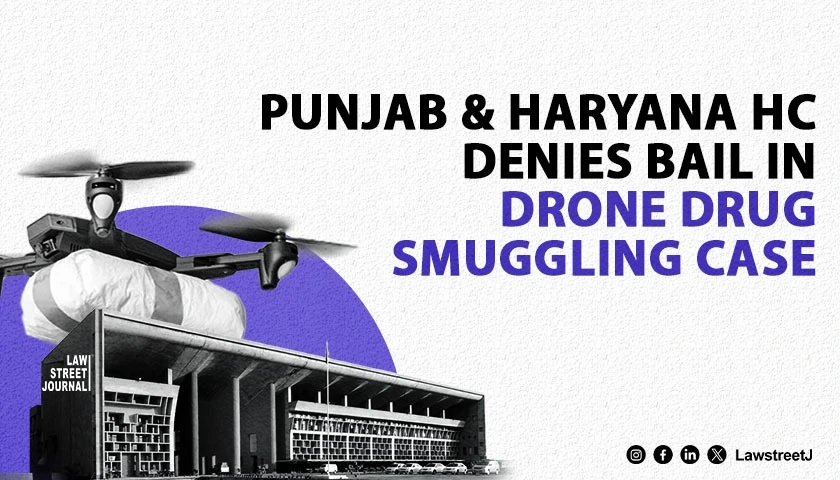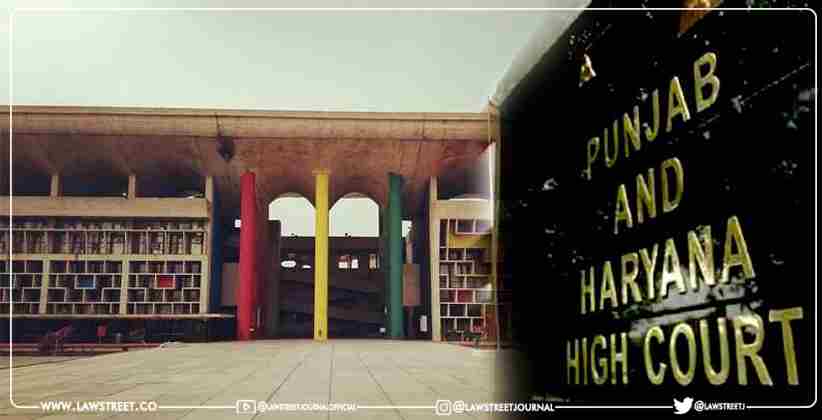Punjab: The Punjab & Haryana High Court has denied anticipatory bail to an alleged mastermind of a cross-border drug smuggling network, observing that the rising use of drones for drug trafficking from Pakistan poses a grave threat to national security and the nation’s youth.
Justice Rupinderjit Chahal delivered strong observations about the serious threat posed by cross-border drug smuggling, emphasizing the need for custodial interrogation to effectively unearth drug nexuses and protect societal interests.
The Court was hearing CRM-M No. 20005 of 2025 filed under Section 482 of the BNSS, 2023, by Robert Masih, seeking anticipatory bail in FIR No. 53 dated September 24, 2024, registered under Section 21 of the Narcotic Drugs and Psychotropic Substances Act, 1985 (with Section 29 added later) at Police Station Narot Jaimal Singh, District Pathankot.
The case emerged from investigations into co-accused Harjit Singh alias Jeeta, who was in custody in FIR No. 51 dated September 18, 2024, under Sections 3 and 4 of the Official Secrets Act, 1923, Sections 10, 11, and 12 of the Aircraft Act, 1934, and Sections 21 and 27-A of the NDPS Act. During interrogation, the co-accused disclosed that he was involved in drug smuggling for one Sukhdeep Singh alias Gudha, and revealed that the consignment was supplied from Pakistan through drones, with the petitioner Robert Masih providing funds for the operations.
Counsel for the petitioner argued that his client had been falsely implicated and was not named in the original FIR. He contended that the petitioner was nominated as an accused solely on the basis of the disclosure statement made by co-accused Harjit Singh alias Jeeta, and that no recovery was to be effected from the petitioner. The counsel submitted that the petitioner was ready and willing to join the investigation as and when called upon by the investigating agency.
The petitioner had initially approached the Special Court, Pathankot, for anticipatory bail, which was dismissed vide order dated January 15, 2025, prompting the present petition before the High Court.
The State counsel strongly opposed the bail application, referring to the status report and emphasizing the serious nature of the allegations. He argued that a commercial quantity of heroin had been recovered from the co-accused, which was being transported across the border from Pakistan through drones, and that the petitioner was the person to whom the heroin was being supplied.
The prosecution further submitted that the petitioner was part of a drug nexus that smuggled heroin from Pakistan using drones. The State argued that custodial interrogation was necessary to ascertain the petitioner’s role in the drug network and to recover drones, mobile devices, SIM cards, bank accounts, and other evidence crucial to unearthing the entire operation.
Significantly, the State informed the Court that the petitioner had been declared a proclaimed offender on May 19, 2025, and was involved in multiple other cases, indicating that he was a habitual offender.
Justice Chahal noted the severity of the allegations, observing,
“As per the prosecution, the contraband i.e. heroin which was recovered from co-accused Harjit Singh alias Jeeta was to be supplied to the present petitioner, and the same was received from across the border from Pakistan through drone. The present petitioner is alleged to be the mastermind of the drug supply chain from Pakistan.”
In particularly strong observations about the broader implications of such crimes, the Court stated,
“There is a steady increase in cross-border smuggling of illicit drugs through drones these days. The increasing instances of drug smuggling through drones in India from across the border i.e. Pakistan pose a grave threat not only to the security of the nation but also impact the youth of the nation.”
The Court emphasized that the petitioner had been declared a proclaimed offender and had multiple other cases pending against him. Considering the gravity of the allegations, Justice Chahal held that custodial interrogation was essential for a fair and effective investigation.
The High Court outlined the principles governing anticipatory bail applications, stating,
“While considering a plea for grant of anticipatory bail, the Court has to equilibrate between safeguarding individual rights and protecting societal interests. The Court ought to reckon with the magnitude and nature of the offence, the role attributed to the accused, the need for fair and free investigation, as also the deeper and wider impact of such alleged iniquities on society.”
Justice Chahal relied on the Supreme Court’s landmark judgment in State vs. Anil Sharma (1997) 7 SCC 187, which held that custodial interrogation is qualitatively more elicitation-oriented than questioning a suspect who is protected by a favorable anticipatory bail order. The Supreme Court had observed that effective interrogation is of tremendous advantage in discovering useful information and materials that would otherwise remain concealed, and that success in such interrogation would elude if the suspect knows he is protected by a pre-arrest bail order.
Quoting the Supreme Court’s directive, the High Court noted,
“Very often interrogation in such a condition would reduce to a mere ritual. The argument that custodial interrogation is fraught with the danger of the person being subjected to third-degree methods need not be countenanced, for such an argument can be advanced by all accused in all criminal cases.”
The Court emphasized that it must presume that responsible police officers would conduct themselves responsibly, and that those entrusted with investigating offences would not themselves become offenders.
In its final determination, Justice Chahal held,
“This Court finds no merit in the present petition in the factual matrix of the case in hand. Moreover, custodial interrogation of the petitioner is necessary for effective investigation, and if it is denied, it will leave many loose ends, which is not desired.”
The Court clarified that its observations should not be deemed an expression of opinion on the merits of the case or the investigation, ensuring that the trial court’s independence in adjudicating the matter would not be prejudiced.
Mr. Ritesh Pandey appeared as advocate for the petitioner, while Mr. Ravinder Singh, DAG, Punjab, represented the State.
Case Title: Robert Masih vs. State of Punjab




![Police protection to fund manager alleging threat from Kirron Kher & aide: Punjab & Haryana HC [Read Order]](/secure/uploads/2023/12/lj_9007_Police_Kirron_Kher.jpg)
![Most interested witness being the father of deceased, SC upholds acquittal of 6 accused for murder [Read Judgment]](/secure/uploads/2023/12/lj_9904_df2c02a2-d8c5-4dd6-8b58-a59e17b8635b.jpg)
![Supreme Court Collegium approves new Chief Justices for five key High Courts in India [Read Recommendations]](/secure/uploads/2023/12/lj_8000_380d1135-6f3a-4988-a00a-4d5cd5901815.jpg)




